- Home
- catt dahman
The End of the Road: Z is for Zombie Book 8 (Z is for Zombie: Book)
The End of the Road: Z is for Zombie Book 8 (Z is for Zombie: Book) Read online
The End of the Road
Z is for Zombie: Book 8
catt dahman
Chapter 1
Ten Years Before: Most Effective, Indiscriminate, All Encompassing Killer of All Times.
“Prions: malformed, incorrectly folded proteins that ruined the brain. They removed all traces of personality and control and left the more basics of instincts.Simple things.”
That was what the reporters on television said was sweeping the globe, a prion disease, like a Trojan horse, that originally entered bodies via a flu virus. The man didn’t understand all the fancy explanations, but he understood that the virus caused massive bodily bleeding with a high fever, headache, and pain. After that part ravaged and humiliated people with no relief available, the victims who contracted the infection fell into a coma as the prions went to work.
It was the most effective, indiscriminate, all-encompassing killer of all time, a lot like the meteor that took out the dinosaurs sixty-five million years before, destroying without consideration of age, gender, or intelligence. Once unleashed, it took more lives exponentially as the ill infected other people and animals died from lack of care; again, only rats and roaches did well.
During emergencies such as natural catastrophes, a person watched the news and listened to the opinions of people who showed charts and maps, used a lot of technical language, and seemed calm and supportive.
They explained why something was going to occur and what someone could do to remain safe, gave lists of resources, and above all, said that everything would be all right. If it were medical, they promised inoculations and said that the health care professionals were working non-stop.
The government had military and medical professionals ready to keep peace and safety, and rescue stations were full of helpful people, plenty of healthy food, clean water, and sanitation.The people felt this would work out. But if we thought back, Hurricane Katrina dispelled most of that, as bodies were left to rot in the streets; people rioted, raped, and robbed; looters ran wild; and no place was really safe and supplied with necessities.
Still, this was modern times, and something could be done.Despite the doomsayers,
it couldn’t be as bad as they claimed. Right?
You thought maybe the reports from overseas were so bad because countries had poor communication resources or they didn’t have proper sanitation and medical standards or because maybe people over there (meaning anywhere but here) were a little more prone to violence, to dramatics, to panic, and to laziness?
People didn’t stop to think just how many ridiculous excuses they made for why other countries claimed they fell beneath the masses of the infected.
It was simply incomprehensible to imagine that anything like that could happen on US soil. And when England suffered the same fate and then Canada, people felt the fear tighten about their throats. That was when absolute denial, utter helplessness, or survival mode set in. Pick one of those three, or pick all of the above.
Chapter 2
Ten Years Before: Robert from Disbelief to Despair.
The man sat with his head in his hands, resting as much as he could, his stomach in tight knots and his ears alert to every sound in his home. He had been on
his own and alone although the house was not empty.
He shared his home with two children and a loving wife, all three in another other room, but there was no laughter. There was no talking. There was nothing.
In the master bedroom in the king-sized bed, were his wife and two children,
all three sleeping in what would be (if reports were true) their final slumber that looked restless and messy. He removed the pretty pillows and nice comforter days before, and only the plain sheets and a washable fleece blanket remained.
They lay in a coma, their brains changed forever as the high fever and prions
did the jobs they were created to do. Prions: malformed, incorrectly folded proteins
that ruined the brain. They removed all traces of personality and control and left the
more basics of instincts.Simple things.
Robert had somewhat believed hospitals were closed, but when he saw the guards waving away would-be patients, he blinked a few times to be sure of what he saw.His wife and two children were bundled into soiled blankets in the car.
Military guards were tired, angry, and hopeless and stood at their posts, half-heartedly sending people away from medical facilities at gunpoint. Their eyes shifted to one another occasionally, not wanting to be the first to break and desert one’s post, but ready. Oh, so ready.
At some point, the people here wouldn’t have water or clean beds either. The medical personnel wouldn’t stay here much longer but would desert a failing cause, along with the soldiers. Why they stayed this long amazed Robert in some ways; they weren’t saints, just people with their own families and friends.
The rescue station Robert was referred to was also closed while people stood outside, begging and crying to be allowed in so they or their family members could be treated. He saw the same faces over and over: sad, desperate eyes, pale skins, and mouths drawn in acute worry. If he looked into a mirror, he would see the same visage.
There was no treatment, the reports said.
His nose stung from the stench of the car as the children lost control of their bowels, wailing with the agony and humiliation of the loss of control. The filth burned their skins since they were raw and painful from being cleaned so many times. The thick towels folded beneath them were filthy, and he felt no shame in tossing the towels out the car window and replacing them with clean towels he had thought to bring. His wife’s blanket was coated with sticky, crimson blood as her nose poured and as she wiped at it between groans of pain.
He wanted to beat his head against the car until he passed out or died; he was dying as he watched his loved ones suffer.
People, too sick to go any farther, complained about being left out of the rescue center and fell to the asphalt with despair and weakness. When the pavement was covered by the ill, other ill people lay in the grassy ditches and sidewalks.
A few went at the guards with guns, trying to threaten their way in, only to be shot. When that happened, the rest looked at the scene with glassy eyes but lost interest as they dealt with their own situations. No one even bothered to pick up the guns that the dead people no longer needed.
Family members walked around, helplessly wondering what to do next, either getting their family back to the cars they came in or sitting beside them, waiting. When people ran at the doors, calm military personnel shot them in the head, their faces impassive and tired.
“Where are all the medical stations? Where do we go now?” a woman cried out. She looked at everyone else for an answer. The CDC already admitted that even with a few days’ warning, they couldn’t serve all that were ill. “Why won’t they help us? Don’t we matter?
This is America; where is our help?”
Robert considered that.A dozen more medical stations could be set up, but who was well enough to run them and where would the supplies come from? He watched the woman curiously walk towards the ditch as several people shambled from behind a building, but while the woman raised a hand to them as a sort of wave, Robert felt a chill crawl up his spine.
He had a sick family, but these people weren’t sick; they had cloudy eyes unfocused on anything, and they shuffled strangely, kind of drunkenly. They had missing hands and wounds that leaked. He had seen on the news and Internet what the ill people did.
“Hey,” Robert yelled to the military drones and pointed to th
e creatures, which were coming at them. He had to yell several times to get them to pay attention. The guns split the air with a barrage of bullets, and the things went down, but so did the woman who was too close to them; they killed her.
That may have been the kindest act of all.
A lot of people climbed into cars then, perhaps thinking that would be safer. Robert wondered how long they would sit there and wait. When he looked back at the guards, he counted three times to be sure, but was positive one of the men vanished; the one closest to the edge of their patrol was gone.
Driving back home, Robert got through fairly easily since most traffic was headed the other way, either trying to get to the closed hospitals and rescue station or out of town. Where they thought they could go, Robert didn’t know, but he thought all the people wasted their time instead of hunkering down in their homes and caring for themselves.
He made three trips to get his wife and children back into the house and to the bed. Then he cleaned each of them and then threw soiled clothing and linens into the washer again, again and again. There was always the humming of the washer and the thump of the dryer.
He looked out the window of his house. He blinked a few times to get his eyes to focus.
In the rose bed was his neighbor, a man he didn’t know by name, only by sight; he was lying there dead, amid the fading blossoms, a few bullet holes in his stomach and one neatly in his head. Robert never thought about shooting anyone before.He hunted some and didn’t miss too many times before killing the man who had beaten on their front door and windows until Robert was sure the glass would break.
If the man got inside, Robert would have attacked.
Bloody handprints and dried saliva marred the window. Snapping and drooling, the man tried for hours to get inside to bite Robert until Robert finally stepped outside and shot him.
The man was crazed and lunged at Robert with little hisses and moans. Robert felt a little disturbed that he took a life but was also sure things were critical: kill or be killed.
That was how Robert went from disbelief, to despair, to survival.
Reporters on television didn’t come out and say to kill all the infected, but they did
say to protect oneself and added that a head-splitting blow to the head or shot to the
brain was the only way to stop the infected people from attacking.
Oh, and they showed film after film of the infected biting and eating their way through crowds of people, infecting those as well. They showed the military shooting them in the heads when they attacked. That told people what needed to be done.
The infection was called Red on the Internet. The media tried to remember to call it Diamond Flux. On the Internet, they called them zombies and Reds (zeds in England) on the news but said they were sick and infected. Robert figured they were all correct.
On television, one man tried to complain on camera that they were humans, had a right to treatment, should be isolated, and should be cared for humanely; that was about five seconds before the camera went spinning as the camera man screamed,
the female reporter ran, and the ethic-spouting man had his throat torn out by one of
those he claimed needed help.
Treat ‘em humanely, eh?
What do you do then? Robert kept watching, but the news became sparse as more caught the infection (were eaten alive, who are we kidding). Nothing changed at his house except for his wife’s eyes when she was sure this wasn’t going to be okay after all; she looked scared. When she and the kids started with the first symptoms of fever, aching, then bloody noses, and then worse, Connie knew that they had the infection.
The CDC said it was one hundred percent fatal, well, as fatal as it could be since those who caught the disease still stalked around looking for humans as food. Connie and he prayed together and cried a little while they held the children. He promised he wouldn’t let them become those things.
Then Robert was left to change the sheets again and again and wash towels and to scrub the messes his family left behind, not minding a bit because they still knew him and loved him, despite being so sick. Please don’t let them not know me anymore, he prayed.
There was a moan from the bedroom.
He felt sick all the way into his soul.
Robert took his rifle and walked to the open doorway. “Connie?” he called out, wanting to sit down, to cry, or to sleep and never awaken. “Hon?” He had to be sure she wasn’t herself, and yes, he had the false hope lingering. Maybe this was the one case that would be different. Please, let it be Connie, and let her answer and let the kids be
okay…just this one thing, he begged.
The news was pretty forthcoming, at least at first.The reporters explained about the infection and showed great clips of Europe burning and the people of Tokyo eating one another in the streets, and saying that the CDC was ‘working tirelessly to find answers and get a cure out to the people of the United States’.
As time went on, no more sad stories and no more tearful pleas were on camera, only warnings that loved ones would awake from the comas and spread the infection through bites. They didn’t have any handy advice about what to do when a person actually saw his loved one gnashing teeth and snarling.
But don’t let me see that, Robert asked, let her be okay and not a monster…okay?
Connie was dirty again, her panties and tee shirt clotted with filth, and it crossed Robert’s mind that he wouldn’t be washing her clothing again. He wished he would be doing laundry for years for them. Her eyes, covered with filmy white cataracts, showed nothing, no indication of knowing her husband of ten years or no interest in anything but her own hunger. And she was ready to bite. She didn’t look like the pretty wife he knew, but it was her body, and when he looked at her, he saw Connie, but when she looked at him, she saw food.
He might have stared at the woman until he gave up hope and she snapped
her teeth into his flesh, but his daughter crawled on the bed, hissing at her mother
like some demonic animal, his little girl. She moved like a spider.
They were about to fight over his flesh.
Robert almost turned around, slammed the door, and ran away, but something nagged at him. Would there be a cure? Could anyone repair the damage he saw? He wouldn’t want to walk around as a monster, eating flesh and chasing people until he weathered away. To let them be like this was the cruelest thing he could think of. And he did promise.
With that in mind, he shot his wife, daughter, and son in the head, crying so hard it was hard to line up the shots. After he shot them, he knew in his heart that as bad as it was for him, it was by far, the right thing to do. He beat at the wall as he screamed in agony.
He vomited until his belly was empty.
After he finished, he covered their bodies and closed the door. He crawled along the hallway to his daughter’s bedroom and stopped a few times to grasp at his own body and wail aloud as he rolled.
Chapter 3
Ten Years Before: Robert: From Despair to Survival.
Robert pulled blankets down from the top of the linen closet to hide beneath,
lay down on the twin bed, slept a long time, got up for a bottle of water, some pain relievers, and a can of Pepsi; he quickly had a pee before he slept again. He flushed, washed his hands, and saw a man he didn’t know in the bathroom mirror.
He dreamed of thunder and of the earth shaking beneath him. When he got up again, he heated a can of ravioli, which his daughter loved, and he chased it with water to keep from dehydrating from all the crying he did. He felt no better and no worse
but was very tired, so he went back to the bed to sleep.
For three days and nights, all he did was sleep in his cocoon, drink, and eat whatever sounded good at the time. In time, he felt a little better. It almost felt selfish to be satisfied, but the sleep, food, and water made him feel considerably better.
He realized that in the days before, he did not sleep nor eat while
he cared for his family, terrified of their leaving him while he was asleep. It was over.
Robert ignored the faint sound of blowflies in the master bedroom and a bad smell that seeped from under the door and through the walls.
Nothing was on television, so he figured no one was going to give him a blueprint for what to do next, not that anything so far helped him. Little by little, feeling returned to his numb body, and he stopped shaking.
He piled only the basics into a backpack his daughter used for school. It had a big, friendly cat’s face on it; the cat had button eyes, whiskers, and a red bow. He thought
backpack went with a saying like ‘hi, kitty cat’ or something friendly.
Inside the backpack went his flashlight, a knife, more ammo, twine, several
bottles of water, and whatever else he thought was lightweight and looked good from
the food pantry. In one of the heavy rubbery bags that his wife had used for grocery
shopping, he added a few more items he thought would be useful that day as he made
his way into a world that had changed.
He put on jeans, a tee, long sleeved shirt, some good socks, boots, and a
baseball cap. He didn’t know what to pack because he didn’t know where he was
going.
The last news was that people should remain in their homes and work together. Robert didn’t see how those two things could be done simultaneously. He was
finished, depending on the useless news reports anyway.
Moving quietly, Robert paused at a large oak at the edge of his lawn and leaned against it for a few minutes while he swallowed back another bout of crying and
then looked over the neighborhood. It looked like a war zone.
A woman in a filmy pink gown sprawled in the driveway across from him. Her
head was smashed into the concrete, and one hand seemed to be reaching for an overturned red tricycle. The door to the house was open like a dark maw. Someone
had put her down right in her own driveway.

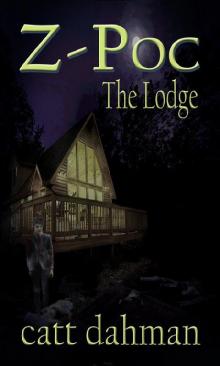 Z Poc: The Lodge
Z Poc: The Lodge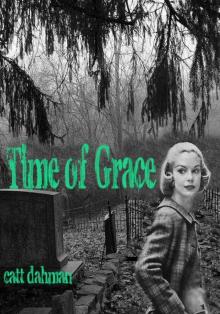 Time of Grace
Time of Grace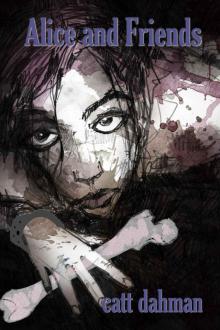 Alice and Friends
Alice and Friends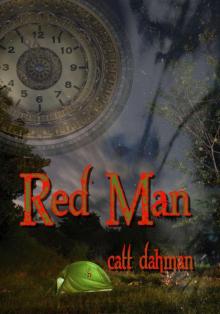 Red Man
Red Man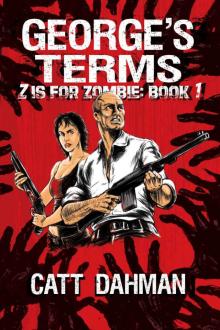 George's Terms: A Zombie Novel (Z Is For Zombie Book 1)
George's Terms: A Zombie Novel (Z Is For Zombie Book 1)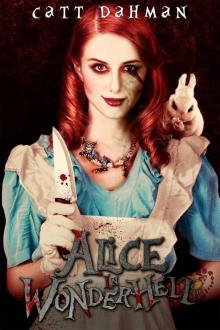 Alice In Wonderhell
Alice In Wonderhell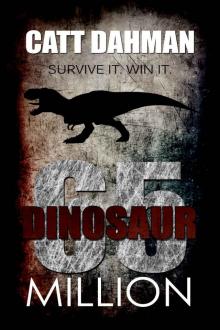 Dinosaur: 65 million
Dinosaur: 65 million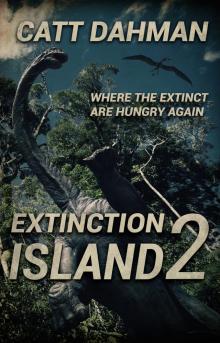 Extinction Island 2
Extinction Island 2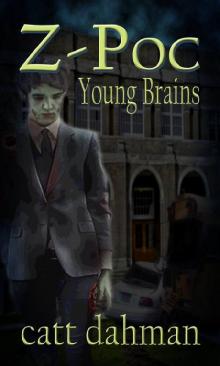 Z Poc: Young Brains
Z Poc: Young Brains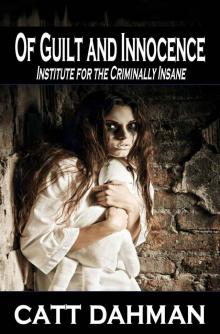 Of Guilt and Innocence: Institute at the Criminally Insane (Virgil McLendon Thrillers Book 3)
Of Guilt and Innocence: Institute at the Criminally Insane (Virgil McLendon Thrillers Book 3)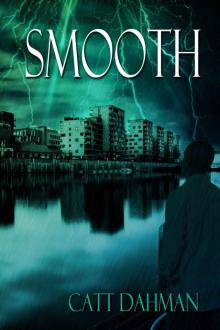 Smooth
Smooth Extinction Island
Extinction Island Of Lost and Found (the Kingsborough House): Kingsborough House (Virgil McLendon Thrillers Book 4)
Of Lost and Found (the Kingsborough House): Kingsborough House (Virgil McLendon Thrillers Book 4)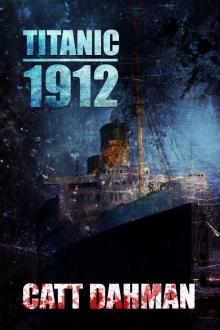 Titanic 1912: A Lovecraft Mythos Novel
Titanic 1912: A Lovecraft Mythos Novel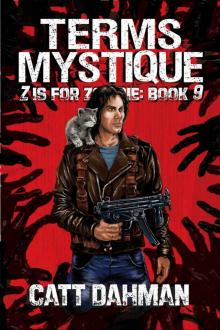 Terms Mystique: Z Is For Zombie 9
Terms Mystique: Z Is For Zombie 9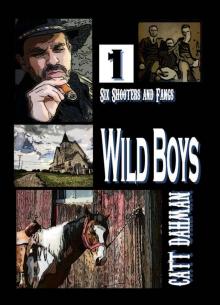 Wild Boys: Six Shooters and Fangs
Wild Boys: Six Shooters and Fangs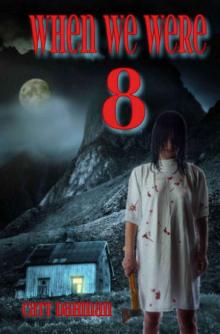 When We Were 8
When We Were 8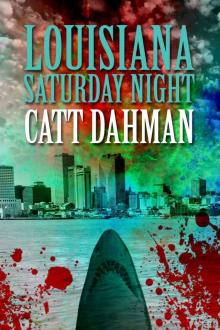 Louisiana Saturday Night
Louisiana Saturday Night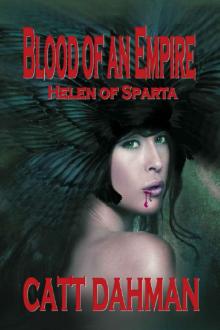 Blood of an Empire: Helen of Sparta
Blood of an Empire: Helen of Sparta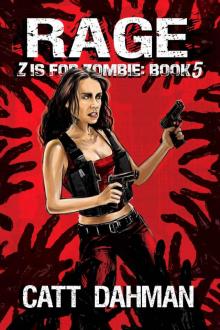 Rage: Z Is For Zombie Book 5
Rage: Z Is For Zombie Book 5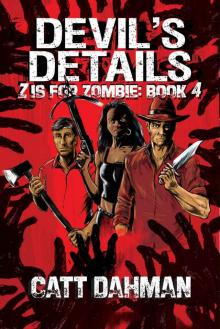 Devil's Details: Z Is For Zombie Book 4
Devil's Details: Z Is For Zombie Book 4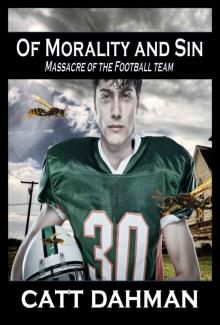 Of Morality and Sin: Massacre of the Football Team (Virgil McLendon Thrillers Book 7)
Of Morality and Sin: Massacre of the Football Team (Virgil McLendon Thrillers Book 7)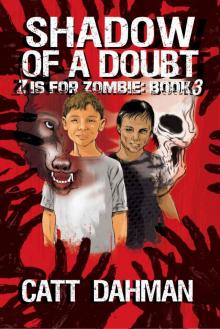 Shadow Of Doubt: Z Is For Zombie Book 3
Shadow Of Doubt: Z Is For Zombie Book 3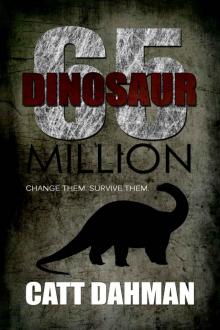 Dinosaur: 65 Million: Book 2 Change Them, Survive Them
Dinosaur: 65 Million: Book 2 Change Them, Survive Them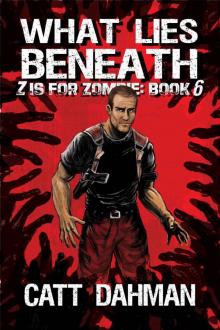 What Lies Beneath: Z is for Zombie Book 6
What Lies Beneath: Z is for Zombie Book 6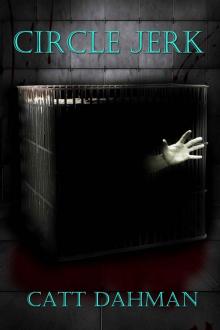 Circle Jerk
Circle Jerk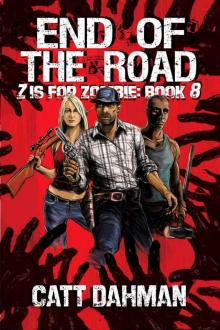 The End of the Road: Z is for Zombie Book 8 (Z is for Zombie: Book)
The End of the Road: Z is for Zombie Book 8 (Z is for Zombie: Book)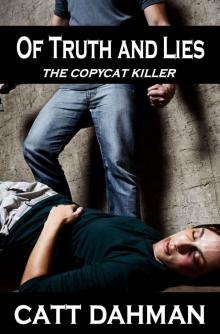 Of Truth and Lies: Hollingsworth Copycat Killer (Virgil McLendon Thrillers Book 5)
Of Truth and Lies: Hollingsworth Copycat Killer (Virgil McLendon Thrillers Book 5)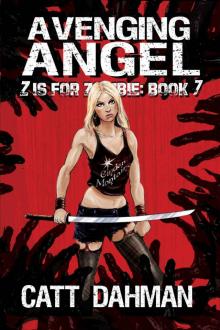 Avenging Angel: Z is for Zombie Book 7
Avenging Angel: Z is for Zombie Book 7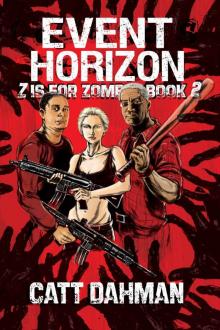 Event Horizon: Z Is For Zombie Book 2
Event Horizon: Z Is For Zombie Book 2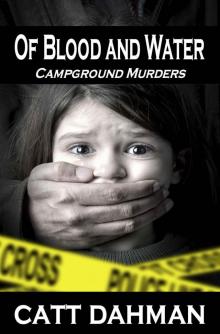 Of Blood and Water: Campground Murders (Virgil McLendon Thrillers Book 1)
Of Blood and Water: Campground Murders (Virgil McLendon Thrillers Book 1)